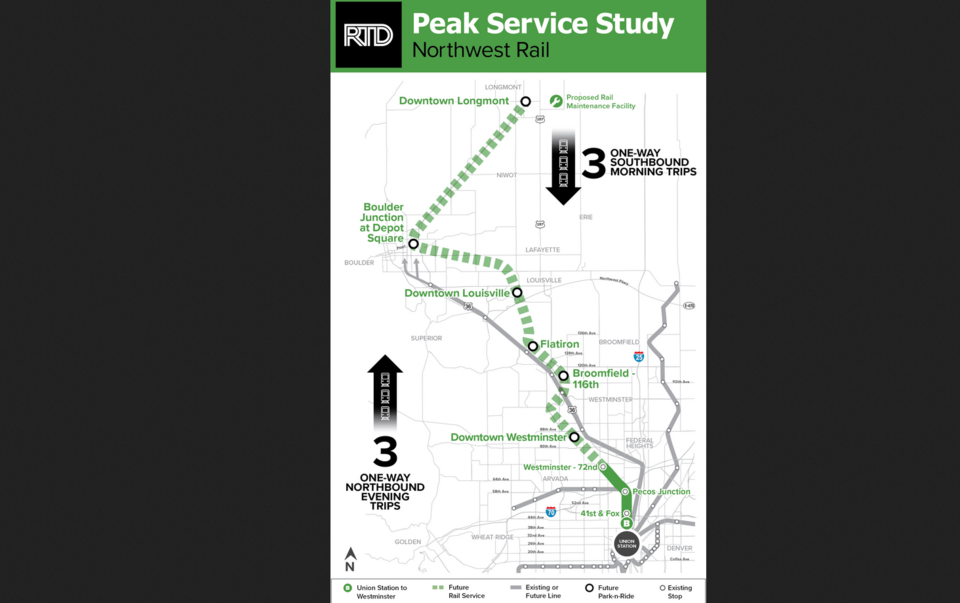The Regional Transportation District envisions an expansion of the Northwest Rail along a private freight rail for commuters from Longmont.
The self-guided online meeting for the Northwest Rail Peak Service Study is available online through Feb. 21, offering information and feedback opportunities for the public.
The purpose of the study is to determine a common set of facts related to the cost, conditions, operating environment and mitigation for the 35-mile extension from the existing Westminster station — which connects to Denver Union Station — up to Longmont, with stops in Boulder, Louisville and Broomfield.
The extension, as proposed, would be on existing freight tracks owned by the Burlington Northern Santa Fe Railway, a first for RTD. To share tracks, freight trains would pull onto siding tracks and wait for commuter trains to proceed.
The expansion would require the building of several siding tracks, but this is less expensive and has fewer impacts than building a second track the length of the railways, RTD said. During peak service, freight trains could spend 60-90 minutes waiting at a siding.
At least initially, the rail would only run three times southbound in the morning and three times northbound in the evening. Full day service might be possible as ridership grows, RTD said.
“Given limited resources, peak service is a possible first step to bring train service to the northwest area sooner than later,” the website said.
The commuter rail proposal is supposed to be more cost effective while RTD pursues funding for all day service, allowing the agency to accomplish initial upgrades. This approach has worked in similar urban areas where ridership has grown over time, the website said, citing Salt Lake City, Seattle, Dallas/Fort Worth and San Diego.
A FasTracks service up to Longmont has been in the making for nearly two decades, dating back to 2004 when voters in the Denver/Boulder metro area approved a 0.4% tax for light rail and commuter rail, but has been slowed by world events like the 2008 recession and the COVID-19 pandemic.
An environmental evaluation for the Northwest Rail was completed in 2010 and then a mobility study in 2013, with the B-line to Westminster beginning service in 2016. RTD started looking at a peak service concept in 2017.
Longmont Transportation Planning Manager Phil Greenwald has worked for the city since 2000, meaning he’s worked on this project his entire career.
“I would just say that the writing was on the wall pretty early on that this was going to be tough to fund,” he said of the Northwest Rail project.
With that in mind, Longmont has focused its attention on building strong transit in other areas. Some examples of this include their work to bring buses to the Highway 119 corridor, create a transit station that works for rail and bus, and build out the Kauffman Street corridor for bus services.
“It’s all part of a system, right?” Greenwald said. “If one piece of the system is going to be delayed, then we need to make sure the other pieces are there so we can have a robust transit network. Then people will feel like — or will know — that they can rely on transit as a safe way to travel, a reliable way to travel.”
Greenwald said the city is also working with regional partners to start an electric bike share as a way to help people complete the first and last mile connections that are critical to public transport.
“We’re just continually looking at different ways of allowing people to move easier in the city,” he said.
The Northwest Rail expansion would require the building of the new stops along with a rail maintenance facility in Longmont. Three locations in southern Longmont are under consideration, and the public can give their input on those.
There is no planned start date for the commuter line. Once input is closed, RTD plans to review, continue coordination, compile a common set of facts and host an open house and online meeting next spring to share the new study information.



